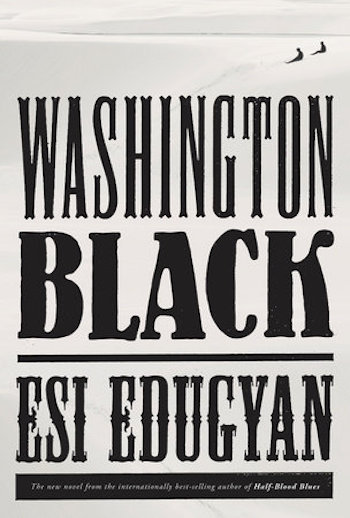Book Review: “Washington Black” — Grappling with the Meanings of Liberty
In Washington Black novelist Esi Edugyan has defied the cliché of the escaped slave discovering freedom.
Washington Black by Esi Edugyan. Knopf, 352 pages. $26.95.
By Roberta Silman

This is a fabulous novel by the Canadian born writer, Esi Edugyan, whose parents came from Ghana to Canada before she was born in 1978 and who has written a “portrait of the artist as a young man” from an entirely new and captivating point of view. George Washington Black (known as Wash to those close to him) is born a slave on a sugar plantation in Barbados. He doesn’t know who his parents are (his discovery of his mother’s identity is part of the plot), and he is terrified when the old owner dies and a new owner Erasmus Wilde takes over. Erasmus is a hard man, the paragon of the cruel plantation owner in the first half of the 19th century. Moreover, this is a sugar cane plantation and the conditions on it are the very worst, much worse than that of a cotton plantation. (Interestingly, there was just this past week a New York Times editorial detailing the horrific archaeological findings of a sugar cane plantation in Texas.) Wash becomes more terrified when Erasmus’s brother Christopher Wilde (known as Titch to those close to him) arrives and chooses Wash to come and work in the big house instead of the fields as his “amanuensis.” Since this novel takes place 1830-36 all kinds of dangers present themselves, but Wash and the reader are in for a surprise.
Unlike his brother, Titch has a vein of goodness and simply sees Wash as being the right weight to launch his air balloon, his Cloud Cutter; once his intentions are established we are all in for an amazing ride. He teaches Wash to read and then they discover that Wash has a real talent for drawing. At first this looks like a novel about how scientific pursuit can take over a man’s life, as it did so often in the 19th century and as it did for the Wilde father who is holed up in the Arctic with his amanuensis and notebooks galore.
But then it takes a darker turn. First there is an accident with the Cloud Cutter: Wash is marked by burns on his face for the rest of his life. And, after his long recovery when he is cared for by his idol Big Kit, Wash witnesses a cousin of the Wilde family kill himself. Titch realizes that Wash will be somehow blamed or at least implicated in this death, so the pair must escape. That’s when the Cloud Cutter is suddenly put to use. Their getaway could be part of a Marquez novel of magical realism, but in this novel it is real and entirely believable. Here is Wash describing it:
I saw the threatening sky below, a great red crack of light, like a monstrous eye just opening. The sky was still black where we were, but the wind was already hurtling us seaward. I watched the half-cut cane fields in the faint light, the white scars of harvest glistening like the part in a woman’s hair.
What did I feel? What would anyone feel, in such a place? My chest ached with anguish and wonder, an astonishment that went on and on, and I could not catch my breath. The Cloud-cutter spun, turned gradually fast, rising ever higher. I began to cry—deep, silent, racking sobs, my face turned away from Titch, staring out onto the boundlessness of the world. The air grew colder, crept in webs across my skin. All was shadow, red light, storm-fire and frenzy. And up we went into the eye of it, untouched, miraculous.
They end up in a storm, are rescued at sea by what at first seems a cliché of a crusty captain, but nothing in this novel is what it seems. They are helped and end up in Norfolk where Titch discovers that there is a bounty, a large bounty of a thousand pounds, on Wash’s head. There they find a link in the Underground Railroad, but when Wash is offered his freedom to go “with his people in upper Canada,” he refuses, saying, “If I am a Freeman then it is my choice where I go.” And so, although Titch is puzzled, and pained, by Wash’s choice, they set off for the Arctic to find Titch’s father. The descriptions of the cold and the far northern landscape are stunning; Edugyan is a writer whose prose disproves the adage ‘less is more.’ Here, as in the equally stunning depictions of the sugar plantation in the Barbados, more is more. Edugyan seems able to do anything, a writer who revels in language both precise and gorgeous.
It is also here Wash learns about the family back in England, particularly the mother Abigail in London who looms over them all. As Titch remembers,
“Erasmus and I used to watch her as she sat for her Italian lessons in the afternoons. She was the most beautiful creature we knew.”
“You were children,” his father said. “You knew nothing of beauty.”
“Children know everything about beauty,” Titch countered softly. “It is adults who have forgotten.”
But it is also in the Arctic that the bond between Titch and Wash is severed. For suddenly Titch is gone, enveloped by the endless, white snow.
And now, about halfway through the novel, it becomes Wash’s story, as he journeys alone through Nova Scotia and finally to England, always aware and always escaping the bounty hunter, one Willard, who is on his tail. There are coincidences in this plot, perhaps too many for some people, but I was not put off. What matters in this part of the novel is the growth of this intelligent, gifted young boy who discovers how hard life really is. Some critics have pointed out that Wash’s inner life reveals someone wiser than his years and that there are times when they felt his voice was too mature to be believable. I think that is an underestimation of adolescence and has the faint tinge of racism.
Wash is unique, especially in his ability to absorb what he experiences and use it to shape his life. He is someone we can learn from. And although without Titch Wash is “a stranger in my own skin,” he discovers that talent must also mean passion, and when he falls in love with a young woman, also an artist named Tanna, he discovers there is another kind of passion which brings with it confusion and sometimes shame. Yet he courageously maneuvers through the dangers that continually plague him: Titch’s mysterious disappearance and the knowledge that Willard is not far behind, even when he and his new “family” emigrate to England in 1836 and he confronts the stately home, Wilde Hall, where Titch and Erasmus were born.

Novelist Esi Edugyan. Photo: Compote Writers Festival.
It is not fair for a reviewer to give away the amazing denouement of this novel so I will end with the encouragement that anyone interested in modern fiction read this beautiful book. Its voice is unforgettable, and its ambition inspires awe and wonder. Edugyan has made a leap of faith and created characters who must grapple with the multifaceted meaning of freedom, how it can bring not only doing what one wishes, but also real responsibilities and obligations. Although the story requires Edugyan to delve into all sorts of 19th century facts and values and customs, Washington Black never has what a writer friend of mine once called “the stink of research.” If anything I would have wished for a little more scientific detail, but that is a matter of taste.
In Washington Black Esi Edugyan has defied the cliché of the escaped slave discovering freedom. The work’s revelations of the bond between a white man and a black boy is almost Biblical in its ability to comfort. As Wash’s story unfolds and often soars, we are intrigued and inspired to hope for a future when such bonds between the races may not only be achieved but also become commonplace.
Roberta Silman is the author of four novels, a short story collection and two children’s books. Her new novel, Secrets and Shadows (Arts Fuse review), is in its second printing and is available on Amazon. A recipient of Fellowships from the Guggenheim Foundation and the National Endowment for the Arts, she has reviewed for The New York Times and The Boston Globe, and writes regularly for The Arts Fuse. More about her can be found at robertasilman.com and she can also be reached at rsilman@verizon.net.
